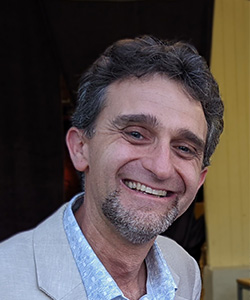
Making Radical Changes with No-Cost Materials
How a Professor Brought His New Vision for a Course to Life through Open Educational Resources
Nigel Caplan, professor of English as Second Language (ESL) at the English Language Institute, was ready to bring radical change to the way he taught his LING 676 Structure of English online course.
The course prepares ESL educators to better support multilingual students in their understanding and development of the English language. Spanning the entirety of English grammar, the course can be challenging for those without a strong background in linguistics. Previously, Caplan used a 600-page print textbook that was informative but admittedly hard to apply in school contexts and less than ideal for an online course.
With the support of the Open and Affordable Teaching Materials grant, Caplan was able to bring his new vision for the course to life – one that incorporated engaging, up-to-date materials that allow course attendees to apply their newfound knowledge and skills in their day-to-day work as educators while bringing the cost of course materials down to $0.
He rebuilt the course around the four “key language uses” that form the basis for the 2020 WIDA English Language Development Framework, which Delaware has adopted. The WIDA Framework, which is available as a free PDF download, is now the core text for the course. It also uses supplemental teaching materials, including a Library-owned e-book with a multi-user license and several open access online sources, like University College London’s Englicious. The grant has also allowed Caplan to develop his own reference guide to the terminology used in the WIDA Framework, called Talking About Language.
Throughout the process, Caplan received support from librarian Maria Barefoot, including expert advice on how to ethically incorporate licensed, copyrighted and public domain materials into his course.
“It’s honestly been liberating not to be bound to a single textbook, which inevitably contains some sections I like and some that make me shudder,” said Caplan. “Open and affordable can also mean flexible and relevant… It’s definitely a lot of work to curate information from multiple sources, but I enjoy the freedom and flexibility to keep the material relevant and up to date.”
For more information on sourcing and using Open Source materials, please contact the library!
